With our feet firmly in the digital present, demand for Platforms-as-a-Service providers will continue to rise. PaaS providers allow businesses to build and host their applications without spending enormous amounts on setting up infrastructure.
According to Allied Market Research, the global PaaS market size was about $44 billion in 2020, with projections showing it should hit $319 billion within this decade, with a CAGR of 22% from 2021 to 2030.
Post-COVID-19, the global PaaS market sits at an estimated $53.211 billion after the pandemic accelerated adoption following work-from-home orders.
Choosing the right PaaS provider can be difficult in a market with more providers than ever. This article examines the current top-tier options and what they can offer your business or organization.
What is PaaS?
Platform-as-a-Service (PaaS) is a cloud computing model that allows businesses to develop, run, and manage applications without dealing with the underlying infrastructure. It provides developers with a complete development and deployment environment, including tools for building, testing, and deploying applications.
In this arrangement, platform-as-a-service providers manage the operating system, middleware, and runtime environment, while the user manages the applications and data. This allows developers to focus on the application code and functionality rather than the underlying infrastructure.
PaaS is especially beneficial for small to medium-sized businesses that need more resources to manage their infrastructure, as it eliminates the need for expensive hardware and software.
PaaS Benefits
Fewer Resources To Start
By outsourcing hardware or software management to a PaaS provider, businesses can save money on application development and deployment resources. This is because PaaS vendors offer fully managed platforms that include everything needed to develop, deploy, and manage applications.
Using A PaaS offering, businesses can focus on their core competencies and leave the infrastructure management to the experts.
Scalability
One of the most significant advantages of PaaS is scalability. As per business needs, PaaS solutions can be scaled up or down without investing too much effort or time in changing system configurations. PaaS providers offer scalable platforms that can handle sudden spikes in traffic or demand, ensuring businesses can continue operating without disruptions.
Flexibility
PaaS solutions are highly flexible, allowing businesses to easily adapt to changing market demands and user requirements by accessing a wide range of services, such as application development frameworks, databases, messaging systems, and more, which can be easily integrated into the application development process.
High Availability
PaaS solutions typically offer high availability of services, ensuring that applications remain running even in the case of system outages or other disruptions. PaaS providers use advanced technologies such as load balancing, failover mechanisms, and redundant data centers to ensure their platforms’ high availability and resilience.
Security
Most PaaS providers use robust security measures, such as encryption, firewalls, and intrusion detection systems, to protect customer data from unauthorized access or malicious attacks. PaaS providers are also responsible for maintaining compliance with industry standards and regulations, such as HIPAA and GDPR, which may be hard for businesses to do in-house.
Reliability
PaaS companies usually have a team of experts responsible for monitoring and maintaining their platforms, ensuring they are always available when needed. To ensure continued reliability, the providers also offer 24/7 support, which is important for businesses that operate globally and may require assistance anytime.
Top PaaS Service Providers
In this list, we are looking at the best PaaS providers in 2023, their key features, and why you should consider them. Let’s dive in.
Google Cloud
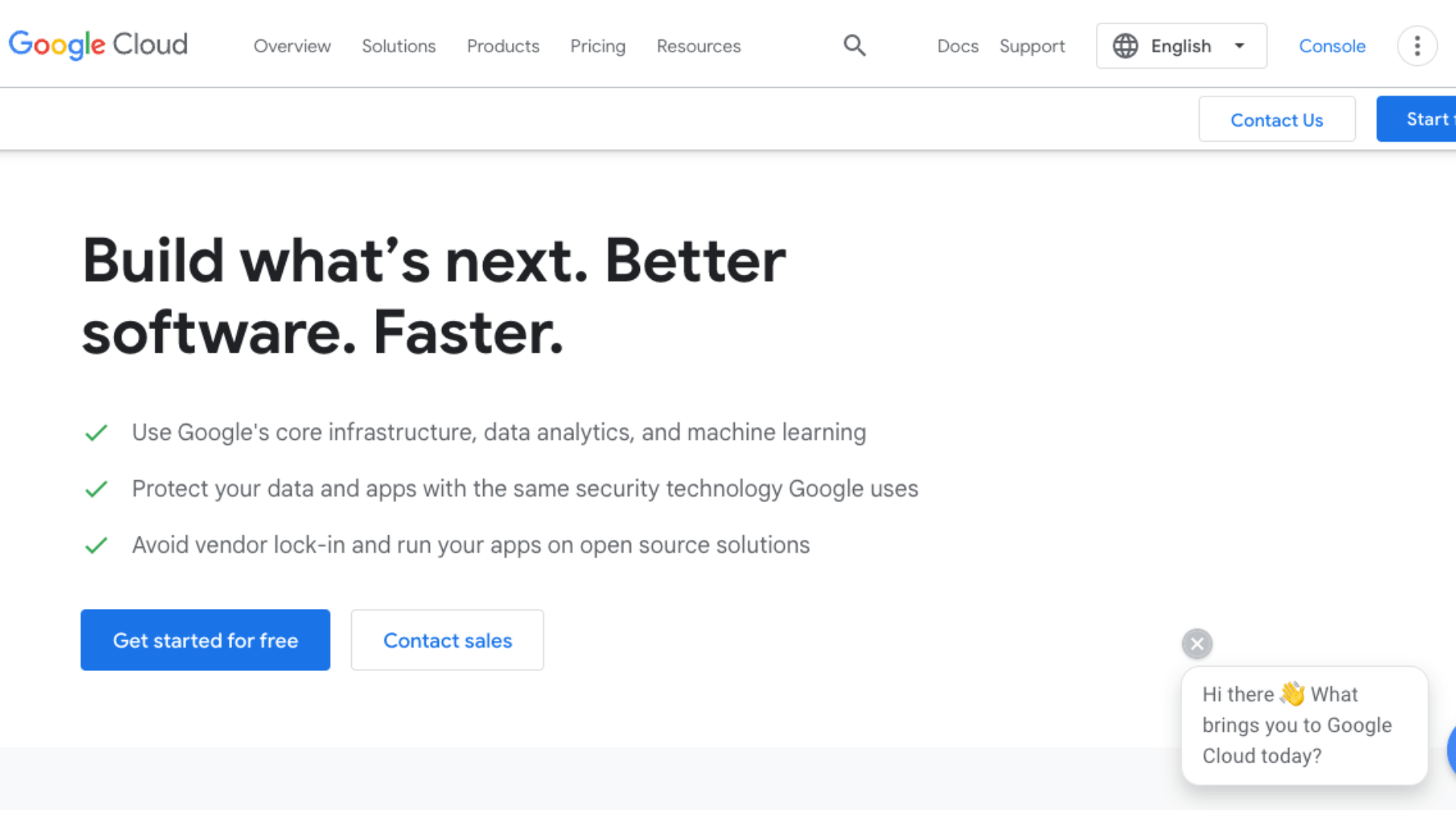
Google Cloud Platform (GCP) is a versatile PaaS provider that offers various cloud-based computing services, including computing, storage, and application development. With it, users get tools and services to support application development, such as a robust SDK, integrated testing, and continuous integration and delivery pipelines.
Key features of GCP include
- Autoscaling: Google Cloud offers autoscaling features that automatically adjust the number of VM instances to match demand, making it easy for businesses to scale their infrastructure based on user traffic without worrying about manual resource management.
- Google Kubernetes Engine (GKE): Users can use GKE to run containerized apps with advanced features for container orchestration, including automated scaling, rolling updates, and self-healing, for easy management of containerized applications across multiple clusters.
- A comprehensive suite of application development tools: Google Cloud offers a comprehensive suite of application development tools, including Cloud Functions for serverless computing and Cloud Firestore for real-time data synchronization.
- Advanced analytics and machine learning tools: Users get tools like BigQuery for data warehousing and AI Platform for building and deploying machine learning models to extract insights from their data, predict outcomes, and automate decision-making, leading to better business outcomes.
- Google Cloud Load Balancing: Google Cloud Load Balancing can intelligently route traffic to the closest instance based on user location or distribute traffic evenly across multiple instances to optimize performance and prevent overloading.
GCP offers a variety of pricing options, including pay-as-you-go pricing, sustained use discounts, and committed use discounts, making it a flexible and cost-effective option for businesses of all sizes.
Reasons to buy GCP
- Its user-friendly design has a simple interface and intuitive tools that developers and IT teams can easily navigate.
- GCP’s autoscaling features and container orchestration tools for time and resources management.
- GCP’s powerful analytics and machine learning tools to gain insights using AI-powered applications.
- GCP’s load balancing and redundancy features for managing system failures or disruptions.
Code Capsules
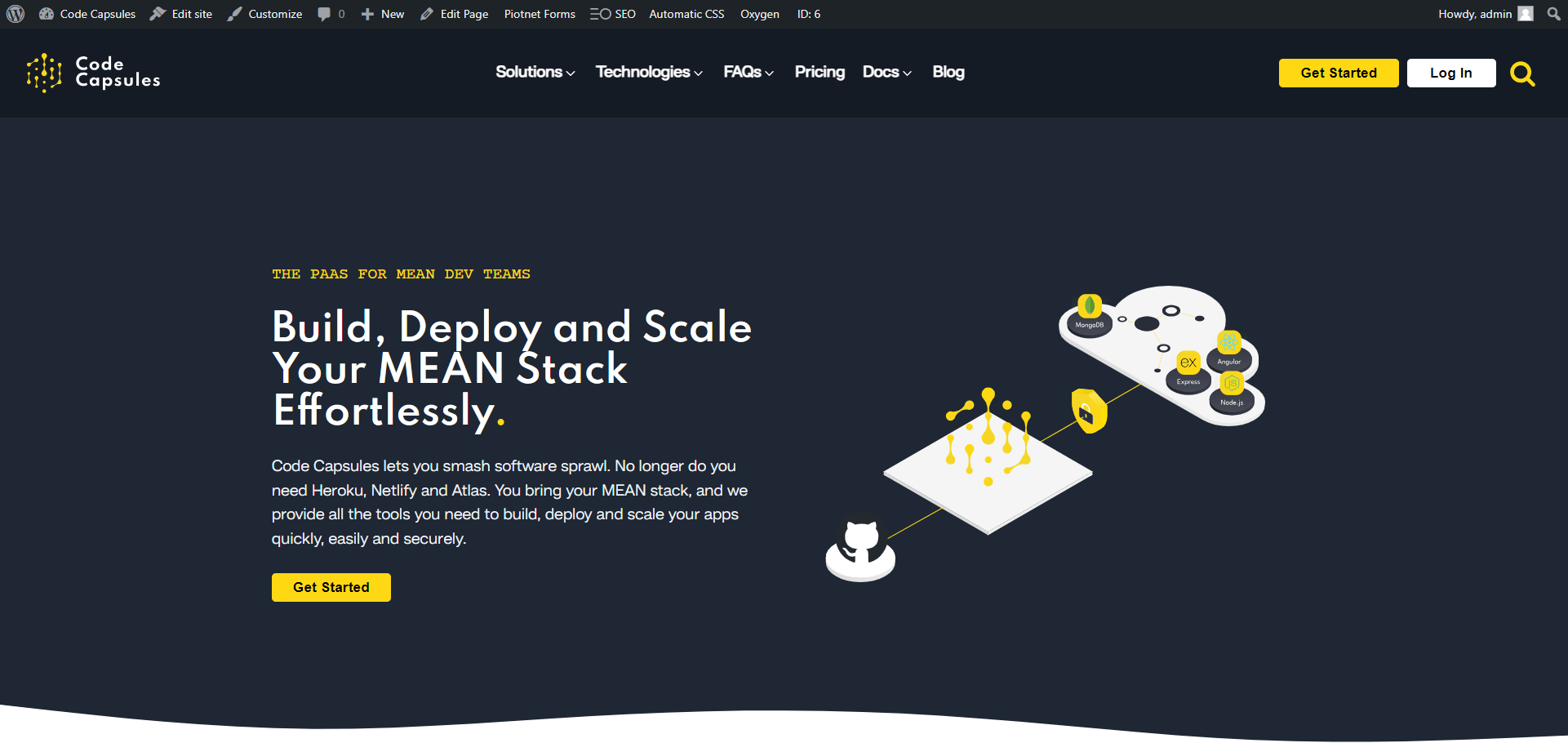
Code Capsules is a PaaS provider that offers a unique application development and deployment approach, allowing businesses to create and run cloud-native applications using simple, modular code blocks called “capsules.”
Key features of Code Capsules include
- Modular architecture: Code Capsules’ modular architecture allows businesses to build applications using small, reusable “capsules” of code, which can be quickly and easily combined to create complex workflows and business logic.
- Serverless computing: Code Capsules uses a serverless computing model, meaning businesses don’t need to worry about managing servers or infrastructure, allowing them to focus on building and deploying applications.
- Built-in scalability: Code Capsules automatically scale up or down to match demand, ensuring that applications remain performant and responsive regardless of traffic levels.
- Multi-cloud support: Code Capsules is designed to be cloud-agnostic, allowing businesses to deploy their applications to multiple cloud providers or on-premises infrastructure as needed.
- Collaborative development: Code Capsules include built-in collaboration features, allowing developers and IT teams to work together on building and deploying applications in real time.
Code Capsules offers a simple and transparent pricing model, with a free tier for small-scale development and testing and paid tiers based on usage and number of users.
Reasons to buy Code Capsules
- Code Capsules’ modular architecture and serverless platform simplify the development and deployment process.
- By eliminating businesses needing to manage servers or infrastructure, Code Capsules can reduce costs and free up resources for other projects or initiatives.
- Code Capsules’ collaboration features and built-in tools can increase productivity and speed development.
- Code Capsules’ transparent pricing model simplifies the billing process and makes it easier for businesses to understand and manage costs.
Cost: Code Capsules’ pricing starts at $5 per month for low-cost dynos in Eco and Basic plans; $25 and up for the Production plan, $250 and up for the Advanced plan, and custom pricing for the Enterprise plan.
Microsoft Azure
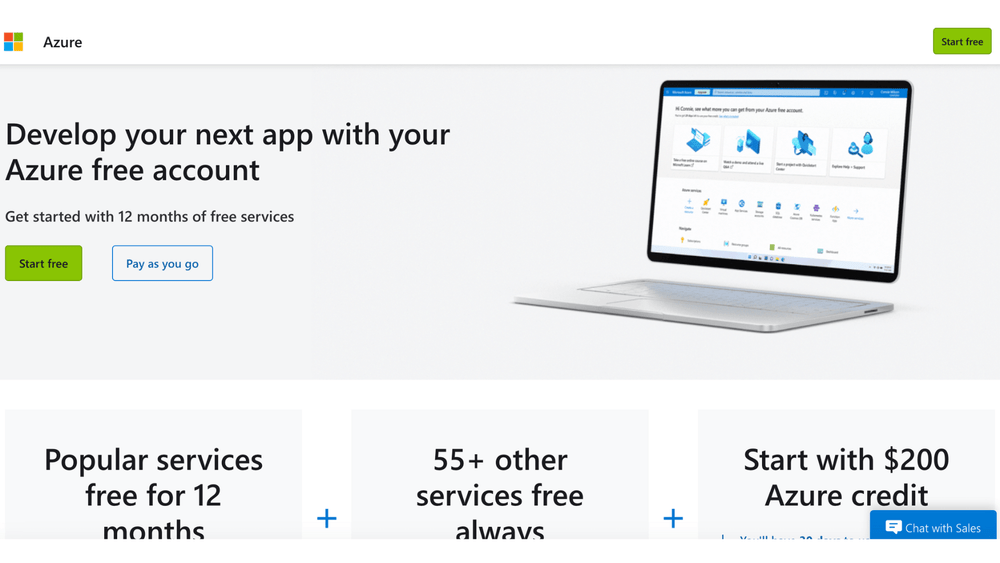
Microsoft Azure offers cloud computing services, with the PaaS offering commonly called the Azure App Service. One of the key benefits of the offering is that it supports a wide range of programming languages and development frameworks, including .NET, Java, Node.js, Python, Django, and PHP. This makes it easy for businesses to choose the tools and languages best suited to their needs.
Key features include
- A wide range of services: Users get mobile apps, web apps, and API management services, managing data (Azure Cosmos DB, Azure SQL Database), and services for managing AI and Machine Learning models.
- DevOps integration: Azure App Service integrates with Azure DevOps for continuous integration and deployment (CI/CD) workflows, allowing developers to automate their applications’ building, testing, and deployment using Visual Studio and Jenkins tools.
- Security: Azure App Service provides various security features such as network isolation, SSL/TLS encryption, and integration with Azure Security Center. This ensures that applications are secure and compliant with industry standards and regulations.
- High availability: Azure App Service ensures high availability of applications with features such as automatic operating system and application patching, geo-redundancy, and load balancing, reducing the risk of downtime and data loss due to hardware or software failures.
- Integration with other Azure services: Azure App Service is deeply integrated with other Azure services such as Active Directory, DevOps, Functions, and Storage. This allows for easy integration and management of various components of a cloud-based application ecosystem.
Reasons to buy Azure
- Extensive integration with other Microsoft products, such as Windows Server, Visual Studio, and Office 365, makes it a natural choice for businesses already using these products.
- A growing community of developers and users offers resources, support, and knowledge-sharing opportunities.
- A wide range of pricing options includes pay-as-you-go, reserved instances, and discounts for longer-term commitments.
- A strong focus on security and compliance, with a comprehensive suite of tools and services for protecting customer data and meeting regulatory requirements.
Heroku
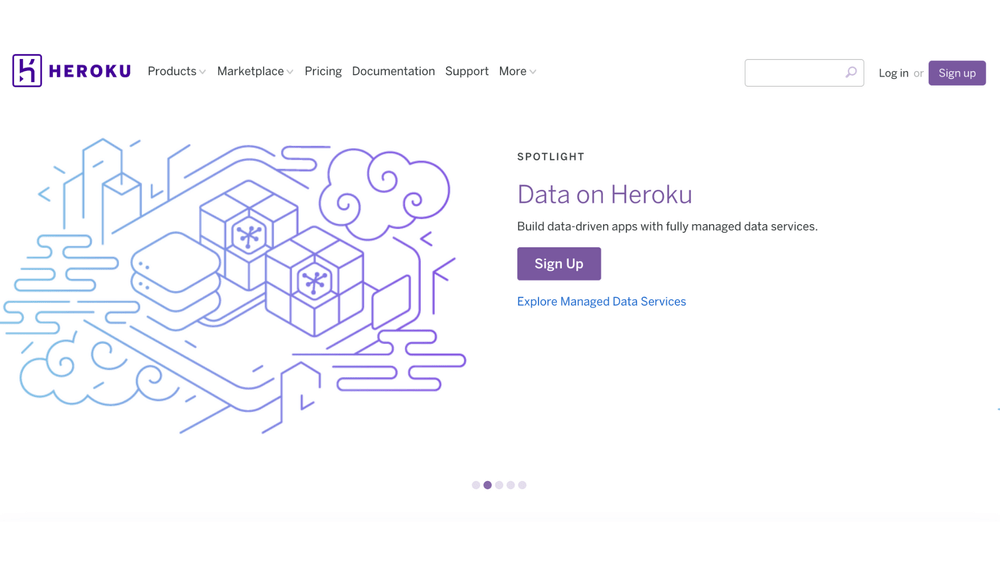
Heroku is a cloud-based PaaS provider that offers developers an easy way to deploy, manage, and scale their applications. With Heroku, developers can focus on building applications while the platform manages the underlying infrastructure.
Key features of Heroku PaaS include
- Dyno-based architecture: Heroku’s architecture is based on the “dyno,” a lightweight container providing a simple and efficient way to run applications. Dynos are isolated, secure, and easily scaled up or down.
- Deployment options: Heroku supports various deployment options, including Git-based deployments, API-based deployments, and container-based deployments.
- Integration with popular development tools: Heroku integrates with popular development tools, such as GitHub, Slack, and JIRA, making it easy for developers to build, test, and deploy their applications.
- Scalability: Heroku offers automatic vertical and horizontal scaling, allowing developers to scale their applications up or down easily based on demand to ensure they remain available even during periods of high traffic.
- Add-ons: Heroku provides a range of add-ons that developers can use to enhance their applications, such as databases, caching, and monitoring tools. These add-ons can be easily integrated into applications without additional configuration.
- High availability and reliability: Heroku provides high availability and reliability by automatically managing the infrastructure, monitoring for issues, and providing instant failover to backup systems in case of any failures.
Reasons to buy Heroku
- Easy deploying, managing, and scaling web applications in the cloud.
- A wide range of add-ons and integrations make adding powerful features to your application easily without building everything from scratch.
- A flexible pricing model allows you to pay only for what you use, making it a cost-effective solution for businesses of all sizes.
- The strong focus on developer productivity provides tools and workflows that make it easy to develop, test, and deploy applications quickly and efficiently.
AWS Elastic Beanstalk
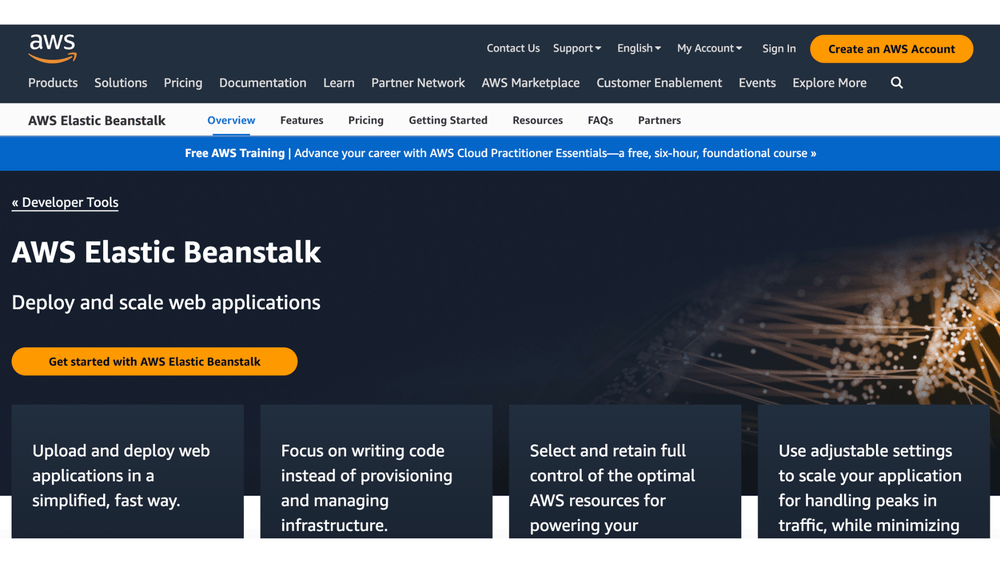
AWS Elastic Beanstalk is a fully managed PaaS offering that simplifies the deployment and scaling of web applications developed using popular languages and frameworks, including Java, .NET, Python, Ruby, Node.js, PHP, and Go. Elastic Beanstalk allows developers to focus on writing code by abstracting away the underlying infrastructure needed to run their applications.
Key features include
- Application deployment made easy: AWS Elastic Beanstalk provides a simple and quick way to deploy web applications, handling the details of capacity provisioning, load balancing, and auto-scaling.
- Multi-platform support: AWS Elastic Beanstalk supports a variety of programming languages and platforms, including Java, .NET, Node.js, PHP, Python, Ruby, and Go.
- Easy scalability: Elastic Beanstalk can automatically scale resources up or down based on traffic or performance requirements, allowing your application to handle traffic spikes and grow with your business.
- Environment management: You can easily create and manage multiple environments, such as development, testing, and production, with AWS Elastic Beanstalk.
- Integrations: Elastic Beanstalk integrates with other AWS services, such as Amazon RDS, Amazon S3, and Amazon DynamoDB, providing a complete solution for building and deploying scalable applications.
- Continuous deployment and integration: Elastic Beanstalk supports continuous deployment and integration with popular tools like Jenkins, AWS CodePipeline, and Git.
- Monitoring and logging: Elastic Beanstalk provides monitoring and logging tools, including Amazon CloudWatch, to help you monitor the performance of your applications and troubleshoot issues.
Reasons to buy Elastic Beanstalk
- Easy management of complex environments with pre-configured platform stacks.
- Simplifies application deployment and scaling with support for multiple languages and web servers.
- Provides detailed application and environment monitoring for effective troubleshooting and optimization.
- Support for rolling deployments and blue-green deployments for seamless application updates and rollbacks.
Engine Yard
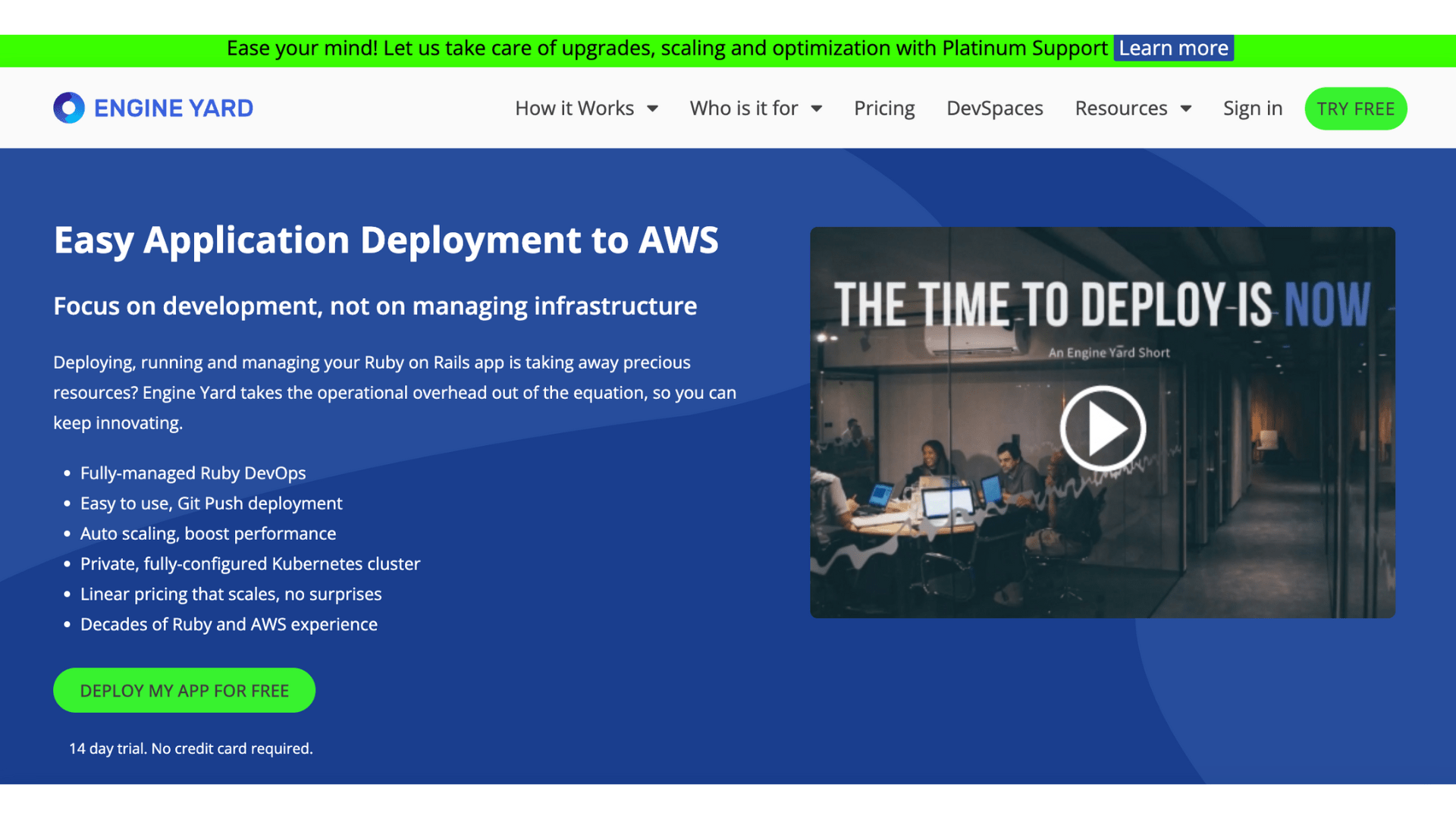
Engine Yard stands out as a unique offering in our list of PaaS platforms. It is built specifically for Ruby on Rails applications, making it a popular choice for developers working with this framework. The platform offers a wide range of tools and features to help developers streamline the deployment and management of their applications, making it a top choice for teams looking to improve their efficiency and productivity.
Key features of Engine Yard include
- Auto-scaling: Engine Yard automatically scales the infrastructure to match the traffic demands, ensuring that the application stays responsive and available to the users, powered by Amazon’s Auto Scaling technology for resource optimization.
- Application management: Engine Yard provides a unified management console for monitoring, deploying, and scaling applications with integrated tools and dashboards.
- Platform flexibility: Engine Yard supports a wide range of programming languages (Ruby, Node.js, PHP, Python), frameworks (Django, Rails, Sinatra), and databases, allowing developers to build applications using their preferred technologies.
- High availability: Users enjoy high availability and fault tolerance for the applications, with multiple availability zones and load balancing to distribute traffic across the infrastructure.
- Expert Support: Engine Yard’s support team includes certified engineers with deep expertise in the platform and the underlying technologies. They provide 24/7 support, monitoring, and troubleshooting for the applications.
Reasons to buy Engine Yard
- Simplifies deployment and management of Ruby and Node.js applications.
- Offers expertise in scaling and maintaining web applications, freeing up development teams to focus on building great software.
- Provides extensive monitoring and alerting capabilities to help detect and diagnose issues before they become major problems.
- Enables rapid development through integrations with popular developer tools and platforms.
- Offers flexible pricing options to fit a variety of business needs and budgets.
Red Hat OpenShift
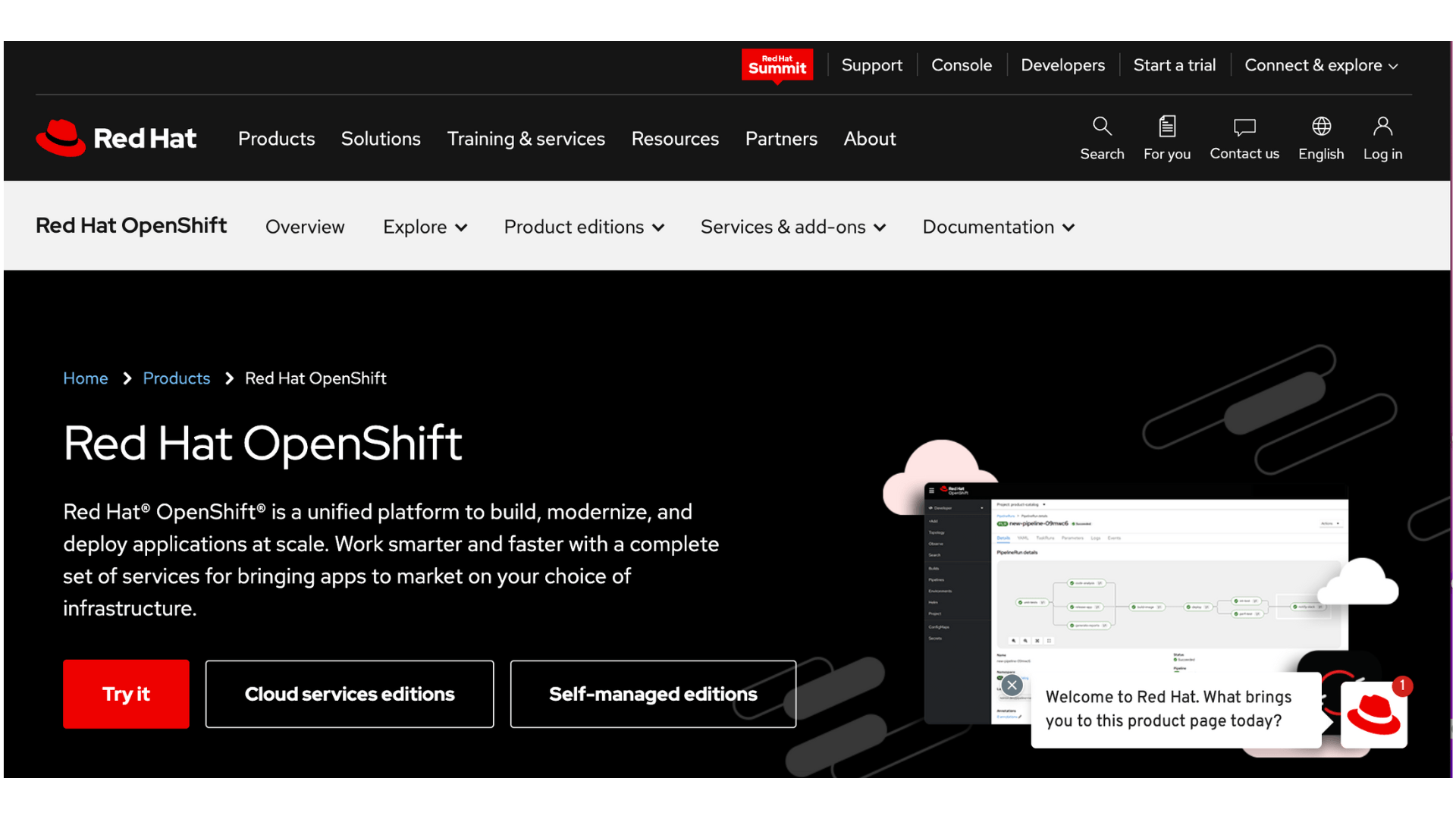
Red Hat OpenShift is one of (if not the) most popular PaaS cloud providers built on Kubernetes. OpenShift enables developers to build, deploy, and manage containerized applications seamlessly, providing a complete container stack to deploy applications easily.
OpenShift combines Docker and Kubernetes, allowing developers to automate the deployment and management of applications.
Key features of Red Hat OpenShift include
- Source-to-Image (S2I) Builder: Red Hat OpenShift provides an S2I Builder that automates the creation of Docker images from source code. This allows developers to focus on writing code instead of manually building and deploying container images.
- Operator Framework: The Operator Framework is a tool set for building Kubernetes-native applications. It allows developers to package, deploy, and manage complex stateful applications on OpenShift, for a simplified and efficient way to manage applications in a containerized environment.
- OpenShift Service Mesh: Red Hat OpenShift provides a built-in service mesh based on Istio. The service mesh provides traffic management, security, and observability, making it easier to manage microservices-based applications.
- Container Security: Red Hat OpenShift includes built-in security features to protect containers and the underlying infrastructure with automated vulnerability scans, compliance enforcement, and secure networking.
- Multi-tenancy: Red Hat OpenShift provides robust multi-tenancy capabilities, allowing multiple teams or applications to share a single OpenShift cluster while maintaining security and isolation.
- Enterprise Support: Red Hat OpenShift is backed by enterprise-level support and services from Red Hat, ensuring reliable and secure operation of mission-critical applications.
Reasons to buy Red Hat OpenShift
- Red Hat OpenShift offers a secure and scalable platform for containerized applications.
- OpenShift’s built-in Kubernetes orchestration provides automatic scaling, self-healing, and easy management of containerized applications.
- With OpenShift, developers can use a variety of languages and frameworks to build, deploy, and manage their applications.
- OpenShift’s streamlined development workflow allows faster time-to-market and easier team collaboration.
- OpenShift provides a flexible and modular architecture that allows customization and integration with other tools and systems.
IBM Cloud
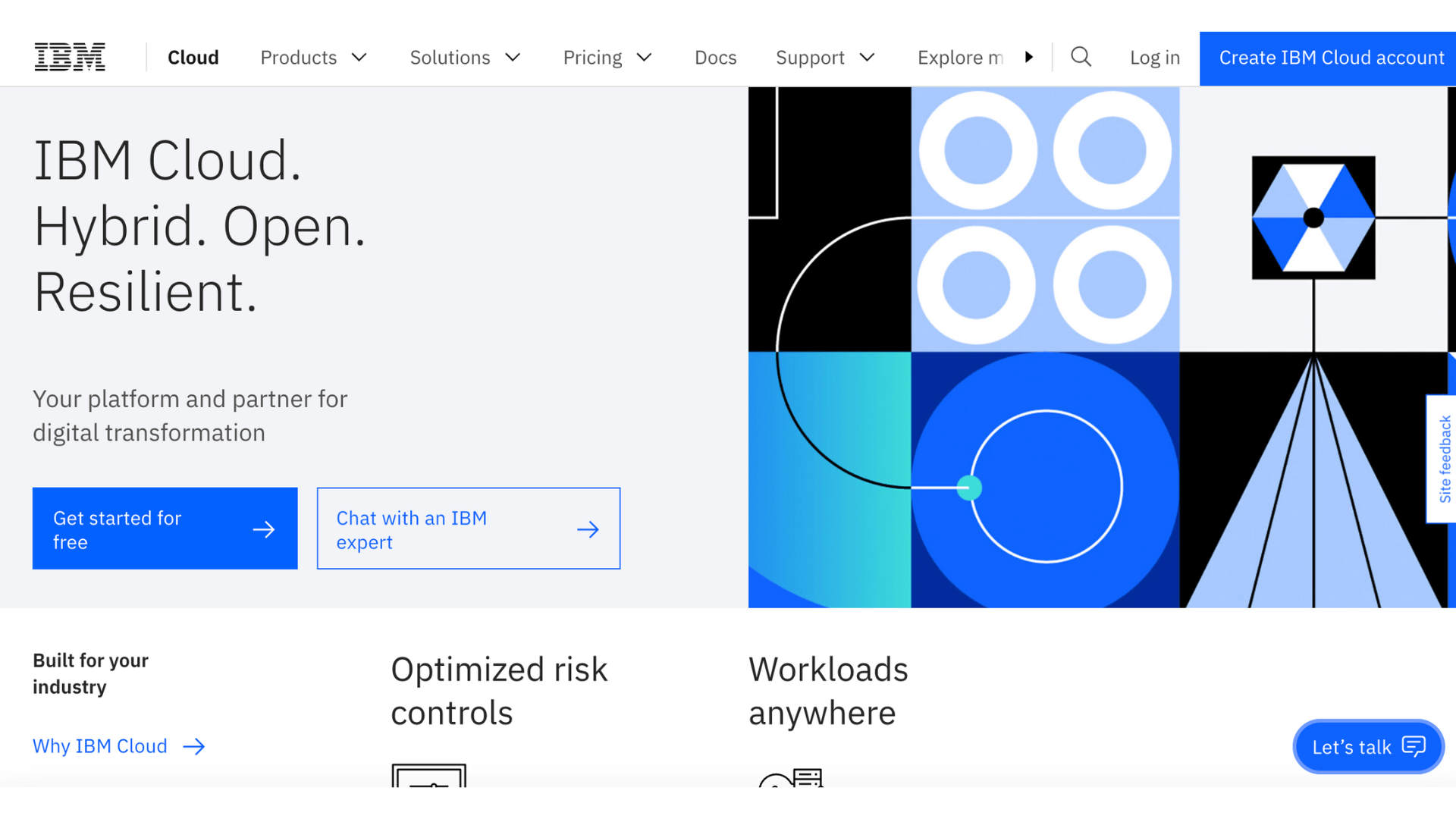
IBM Cloud offers a robust PaaS platform that provides developers with a comprehensive set of tools and services for building, deploying, and managing applications in the cloud. With support for multiple programming languages and frameworks, IBM Cloud Foundry makes it easy to develop and deploy scalable, high-performance applications flexibly and cost-effectively.
Key features of IBM Cloud Foundry include
- Comprehensive language support: IBM Cloud Foundry supports a wide range of programming languages, including Java, Node.js, Ruby, and more.
- Autoscaling: With IBM Cloud Foundry, applications can automatically scale up or down based on demand, helping ensure optimal performance and cost efficiency.
- Easy deployment: IBM Cloud Foundry makes deploying and managing applications easy, with built-in automation and streamlined workflows.
- Service integrations: The platform provides a range of built-in services, including databases, messaging, and caching, as well as integrations with popular third-party services.
- High availability: IBM Cloud Foundry is built with high availability and disaster recovery features, ensuring that applications remain up and running during an outage.
- Security: The platform provides a range of security features, including built-in SSL/TLS support, network isolation, and role-based access control.
- DevOps tooling: IBM Cloud Foundry provides integrated tooling, allowing teams to quickly build, test, and deploy applications in a continuous integration and delivery (CI/CD) pipeline.
Reasons to buy IBM Cloud’s PaaS offering
- Enterprise-grade security and compliance features protect your data and ensure regulatory compliance.
- Advanced analytics and AI capabilities with integrated Watson services for smarter data-driven decision-making.
- Multi-cloud support allows you to run your applications across multiple clouds or on-premises environments.
- Integration with IBM’s broader portfolio of cloud-based services and solutions, providing a wide range of capabilities.
Try Our PaaS Offering Today
Choosing the right PaaS provider can significantly impact the success of your project. Each of the PaaS cloud providers has its unique features, benefits, and drawbacks. Whether it’s Google Cloud App Engine, Heroku, Microsoft Azure App Service, Red Hat OpenShift, IBM Cloud Foundry, AWS Elastic Beanstalk, Engine Yard, or Code Capsules, there is a PaaS provider out there that can meet your specific needs.
It’s essential to consider factors such as usability, design, pricing, deployment options, language support, integrations, scalability, performance, and security.
At Code Capsules, we understand the importance of having a reliable and efficient PaaS provider to support your application development needs. Our platform offers a wide range of features to help streamline the deployment process, including automatic scaling, containerization, load balancing, and high availability. Our focus on performance and security ensures your applications run smoothly and securely.
Sign up to get started with Code Capsules today and see how our platform can take your application development to the next level.
